by Denis Rouse
Rider magazine’s founder and first publisher weighs in from a recent introspective road trip. Part III of III.
This one’s going to be a real head ride. It’s a ride in my head going on right now. No need for a boring tire pressure check or filling up at the local fossil fuel station. It’s passing 5 p.m. and the drinking lamp is lit. We’re gassed up, we’re high on life, and we’re fulminating on a real ride in the future after I’ve endured another mid-winter birthday and when there’s no black ice in the shade of a corner that says seemingly with shining sensuous lips, take me with celerity. This thought could lead to another subject other than riding motorcycles, but the editor would excise it as quickly as a chicken pecks a June bug, so let’s move on. The venue here in my aging gray matter is east central Oregon, east of the Cascades, east of anywhere near Portland where the beige latte people live. The venue here is spare and sparse and the lonely road ascends the high rounded humps of undulating grain that could be mountains on the moon. From deep cuts it arises circuitously, precipitously, then you look back at the upright snake upon which you have ridden, pull over, and tell your co-rider (her name is Diana Dors, remember her?) to ride back down there for a shot of a section of road often portrayed in a rider’s most humid wet dreams. If it’s a full moon coming that night, you won’t want to ride much further because a ghost town comes up quickly on the road ahead. It can be properly called a ghost town—the homes are gray and weather hammered by a hundred winters. If there’s a business still open on Main Street it’s not obvious, but you can tell by some curtains billowing in open windows that someone still lives here, and if you’re lucky you can find a place to stay because you’ll want to ride back up the snake that night for the view of the great high rounded undulating humps of the mountains of the moon bathed in the haunting pewter shadowed light of that lunar body in full splendor.
I like thinking of scenes from future rides. It’s fantasizing of course, but it’s fantasizing that could easily connect to reality in the very near future. Now we’re in Big Pine, California, a small town in the Owens Valley 15 miles south of Bishop, where Highway 395 is Main Street, where you’re sandwiched between the great vertical walls of the Eastern Sierra and the more ancient White Mountains to the east, where Rossi’s Steak House is just a short walk north from your room at the Big Pine Motel where your Harley-Davidson Fat Boy is safely ensconced three feet away from your front door. If Mike Rossi is presiding at the bar at Rossi’s you’re in luck because Mike’s cattle-raising family goes back a long way here. The man and the Rossi family photographs framed on the wall is immersion into local history and isn’t experiencing that one of the main reasons why you ride? If not, I weep for you. Anyway, in the morning, after an evening of steaks and spaghetti and libation and connection to the past in the upper Owens Valley, you get up early for breakfast somewhere in Big Pine where bacon and eggs and hash browns with edges burnt brown and bacon gravy are available since the high end lipids from such a breakfast are an immediate hangover cure. Then, ah, up you go on the road that soars dramatically to the east up to the summit of the Whites where grow the oldest living things on this poor disturbed planet of ours—Bristlecone pines, the five thousand-year-old living things that have survived all of man’s time here. If they could talk, these ancient trees would tell you a tale that would blow all of your conceptions of religion and philosophy, and reality too for that matter, right out the little window through which you’ve been observing things for most of the years of your life here in Toonerville. From the eight-thousand foot summit of the Westgard Pass, you pause at an overlook and gaze below eastward at the floor of a desert valley that seems to sprawl forever, or at least for as far as your miserable eyes can see, but there on the desert floor you see a small patch of green. It’s Deep Springs College, founded in 1917 by an electrical engineer pioneering alternating current and then realizing a student’s learning curve was a sharp vertical rise in the absence of distractions like women and alcohol. Students there now study Shakespeare and help run the cattle ranch in which the college is centered, the founder having as high a regard for Emersonian self-reliance as he did for ground-breaking thinking in hydro-electricity. Do not simply ride by the entrance to Deep Springs College, rather pull in, park the bike, see the nice lady at the desk in the office and request information about the college, about why this place of important California history is so little known by the nice people in Los Angeles. This to me is what motorcycle touring is all about, it’s called discovery, and it is not called riding from Point A to Point B and then having a fat burger before you go to bed.
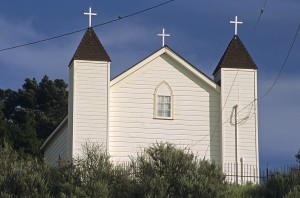
Alright, while we’re dreaming of future rides, here’s another one. You and the woman who rides pressed up behind you, the one you call your co-pilot to soothe her irrational fears about riding her own bike behind you (cheer up, men, her epiphany is coming), have checked into the retro Back Bay Inn in Baywood at the southern end of Morro Bay. Your killer sunset view is the big golden orb going down beyond the spit that separates the bay from the raging sea. You’re happy, she’s happy. The wine hour at the Inn has gone well. Your motorcycle is parked safely two feet from the front door of your room. The big issue of the moment is, how in the hell are you going to get ferried into downtown Morro Bay for the western world’s finest Japanese fare at Harada’s? Consult the nice lady at the office of the Back Bay Inn. Trust me, a cab can be called. You can get to Harada’s, but can you get back? Honestly, I think you can, but for the moment, who cares? Harada-san is a master of Japanese cuisine. You want a Dynamite Roll, he will do it for you, but he will want to behead you too. Notice the big live sweet shrimp in the aquarium behind the sushi bar, notice half of the shrimp are isolated from the main tank; they still have pink roe attached to their bellies. Tell Harada you want the amaebi with the roe attached. He will know then that you are not a gouging schmuck, and the rest of your evening will go as well as your mightiest gustatory dreams have suggested. Tomorrow, you ride south toward L.A. But take heart, in Santa Maria, your writer has a plan for breakfast. You will love his plan.
Now, before you get the idea your writer rides to eat rather than eats to ride, you are correct. This is the first time I’ve admitted this to anyone, so relax. OK, you’re riding south on the two-lane 101 super slab. Hopefully, the traffic is light and you’re not dealing with people driving automobiles behind you and in front of you and astride you that are obviously addled by living way too many years in places like once-sane Arroyo Grande, which is now a community with all the charm of a Wal-Mart parking lot, where the freeway is now the main artery between the malls and the gated communities of the condos of the brain dead where you visit a mother and daughter one day who live in one of those spendy spiritually barren bookless boxes with windows facing the sea and ask Mama, “What is that great promontory to the south jutting into the sea?” You know full well that it’s Point Conception, one of the definitive geographic exclamation points of Central California, and she answers, “I don’t know,” and her facial expression indicates to you that she thinks you’re an elitist ass for even asking a question like that. Existential isolation is a very lonely place. Belay that. When you reach Santa Maria keep your eyes open for the Guadalupe off ramp. Guadalupe is a still very authentic Mexican town populated heavily by Mexican farm workers, many of whom have been here for generations. It’s the kind of town Caesar Chavez would have loved and I’d bet my boots he was here. You’re here for a real Mexican breakfast, and it’s here, in a little storefront place on Main Street, where Mama makes the huevos rancheros and the salsa and the tortillas from scratch, and the whole familia feeling in the place causes you to lament why you were born a white man in the first place.
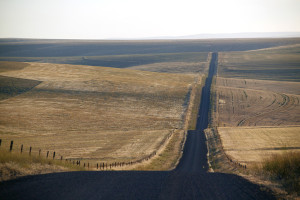
After breakfast, your writer suggests riding west on the old road out to Guadalupe Beach to check out one of the last great estuaries left in coastal California—the mouth of the Santa Maria River, where a sign at the entrance warns visitors to be vigilant regarding the presence here of mountain lions who have been known to scare the bezeezus out of beachgoers in the recent past, especially those with pets and young children. Ignore this warning. Any lion worth her salt has heard your bike coming from two miles away and she wants no part of you. Inhale deeply the rarefied ocean air here. You’re alone at last. The next part of your journey begins just south at the Betteravia off ramp. It’s sad that freeway off ramps have become definitive here, but get over it. I love the last lines in The Lion In Winter when the 12th century English King, Henry II, in a secession crisis, played masterfully by Peter O’Toole, yells to his former Queen Eleanor of Aquitaine, Katherine Hepburn at the top of her game, who is standing astern on a river boat pulling away on the Thames returning her to exile ordered by the king, “Do you think we can live forever, Ellie?” He laughs uproariously. She laughs heartily too. End of movie. At the Betteravia off ramp, descend it and turn left and proceed for several miles on the long straights that border the vast rich agricultural fields of the Santa Maria coastal plain to the hamlet of Sisquoc (which means meeting place in the language of the Chumash, a native peace-loving people who lived here for millennia before the place was called California. They’re long gone of course). Keep onward for a few miles until you see a chapel on a hill. This is the San Ramon Chapel erected with redwood in 1875. In the graveyard there is a stone memorializing an early settler, a British sea captain, Benjamin C. Foxen. Another stone memorial nearby called Foxen Canyon Road reads, “Here on Christmas Day 1846 natives and soldiers from the presidio lay in ambush for Lt. Col. John C. Fremont U.S.A. and his battalion. Advised of the plot, Fremont was guided over the San Marcos Pass by Benjamin Foxen and his son William, and captured Santa Barbara without bloodshed.” Remember Chinese wisdom: No good deed goes unpunished. Captain Foxen was married to a lovely Mexican lass at the time. Her family and many of their neighbors regarded Foxen’s guidance of the Bear Flag rebels as traitorous; they burned his ranch house afterwards. Report to the nearby Sisquoc Winery and taste the elixir produced here on the grounds of an old Spanish land grant. The tasting fee is exorbitant, but you get to keep the glass etched with a likeness of the San Ramon Chapel. Lucky you.
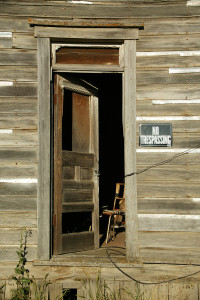
OK, the drinking lamp is still lit, not flickering yet, but close. Now it’s a winter night with a full winter gale howling, wind blowing forty miles an hour with occasional violent gusts that exceed that, the temperature is 32-degrees and the wind chill far in excess of that (consult your wind chill chart here to sober up). You’re inside your garage sitting on your Fat Boy. Your better half is in the kitchen making your favorite version of her wonderful meatloaf, which is to say she has made an extra lava load of gravy to accommodate your sick overdo needs in this regard. You’re sitting there in your garage on your ride, on your Harley, dreaming of your next ride when a night like tonight is a dim but wonderful memory. She opens the door between the kitchen and your garage and says something like, “Honey, just took the meatloaf out of the oven but the meatloaf is still in the oven, if you know what I mean.” You, you poor deranged fool, know exactly what she means. Your Harley can wait. You are a truly blessed man and tonight, sitting on your Harley in your garage with the Battery Tender plugged in, you realize in a pique of ardor, that she’s the best. All of your past stupidity about women suddenly rears its ugly head like a vile hydra and asks, “What were you thinking?” The video of your past isn’t pretty; it’s laced with failure after failure after failure with an occasional win thrown in between. Guess what? In Spanish it’s called la vida, life. And if we’re very lucky we end up like tonight with the meatloaf in the oven.
Related:

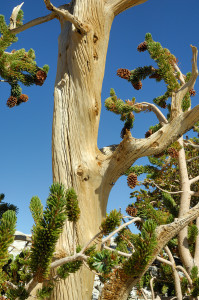

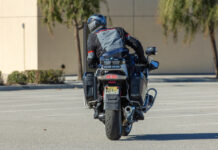





I started reading Rider magazine way back in the 80s. Went to the Rider rallies in Cody and really enjoyed Mr Rouse,s writings. Had a long dark dry spell of no motorcycles and no Rider magazine through the 90s and into the new century Finally came to my senses in 2004 and was delighted to find out that Rider was still around. But was very disappointed to find out that Mr Rouse was no longer at the helm. But now I see that he still stays in touch and blesses us with his musings. All is well.